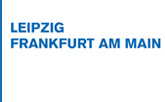Katalog der Deutschen Nationalbibliothek
Ergebnis der Suche nach: dcs=3071* or dcs=3072* or dcs=3073*
|
|
|
| Link zu diesem Datensatz | https://d-nb.info/134898130X |
| Titel | Partizipation in der Stadtentwicklung : Eine kritische Perspektive auf die Öffentlichkeitsbeteiligung / von Anna-Maria Weber |
| Person(en) | Weber, Anna-Maria (Verfasser) |
| Organisation(en) | SpringerLink (Online service) (Sonstige) |
| Ausgabe | 1st ed. 2024 |
| Verlag | Wiesbaden : Springer Fachmedien Wiesbaden, Imprint: Springer VS |
| Zeitliche Einordnung | Erscheinungsdatum: 2024 |
| Umfang/Format | Online-Ressource, XIII, 84 S. 10 Abb., 9 Abb. in Farbe. : online resource. |
| Andere Ausgabe(n) | Erscheint auch als Druck-Ausgabe: Weber, Anna-Maria: Partizipation in der Stadtentwicklung |
| Inhalt | Einführung in Relevanz und Aktualität des Themas -- Wissenschaftstheoretische Grundüberlegungen -- Planung und Partizipation -- Einführung in den Untersuchungsraum Riedlingen -- Forschungsdesign und methodisches Vorgehen -- Konstruktion der Öffentlichkeitsbeteiligung in Riedlingen -- Methodenkritik |
| Persistent Identifier |
URN: urn:nbn:de:101:1-2411220308358.580395280836 DOI: 10.1007/978-3-658-45916-1 |
| URL | https://doi.org/10.1007/978-3-658-45916-1 |
| ISBN/Einband/Preis | 978-3-658-45916-1 |
| Sprache(n) | Deutsch (ger) |
| Beziehungen | RaumFragen: Stadt – Region – Landschaft |
| Schlagwörter | Riedlingen ; Stadtentwicklung ; Bürgerbeteiligung |
| DDC-Notation | 307.1416094347328 [DDC23ger] |
| Sachgruppe(n) | 300 Sozialwissenschaften, Soziologie, Anthropologie |
| Online-Zugriff | Archivobjekt öffnen |

